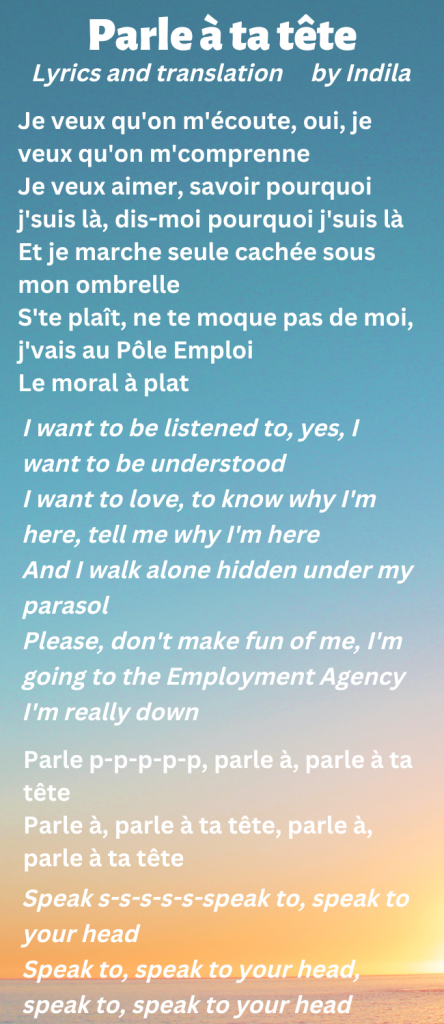Parle à ta tête (Meaning: Speak to your head; Pronunciation: paʀl a ta tɛt) is a hit song released in 2019 by French singer and song-writer Indila. The song is expected to be included on an upcoming album.

Song overview
In the song Parle à ta tête, Indila sings about living up to her full potential, coming out of her shell and leaving a person who’s holding her back. In the beginning of the song, Indila sings about what she wants (Je veux aimer; I want to love), feeling lonely (je marche seule; I walk alone) and feeling frustrated (Le moral est plat; I’m really down).
By the end of the song she expresses her ideal for her life (J’veux faire briller ma vie; I want to make my life shine) and leaving a person who’s keeping her back in life (Pardonne-moi le jour où je n’pourrai plus te parler; Excuse me for the day when I’ll no longer be able to speak to you).
Lyrics analysis
The following section highlights lines from the song which we think offer interesting insights into learning French vocabulary and grammar.
Je veux qu’on m’écoute, oui, je veux qu’on m’comprenne
This line translates to “I want to be listened to, yes, I want to be understood”. Je veux mean I want in French and comes from the verb vouloir.
The personal pronoun on in this line means “one” or people in general. On can also be used to create a passive voice.
This verbs in this line are conjugated in the subjunctive mood, which is used to express wish, emotions and desire.
Je veux aimer, savoir pourquoi j’suis là, dis-moi pourquoi j’suis là
This line translates to “I want to love, to know why I’m here, tell me why I’m here”. The verb aimer mean to love and to like in French. Savoir means to know and pourquoi means why.
J’suis is a shorting of je suis, the first-person singular form of être (to be). The word là in French means there and is also used as a filler word.
Et je marche seule cachée sous mon ombrelle
This line translates to “And I walk alone hidden under my parasol”. The verb marcher means both to walk and to function or work. The preposition sous means under.
The noun ombrelle translate to parasol or sunshade. The word for umbrella (for protection from rain) is parapluie.
The noun ombrelle translate to parasol or sunshade. The word for umbrella (for protection from rain) is parapluie.
S’te plaît, ne te moque pas de moi, j’vais au Pôle Emploi
This line translate to “Please, don’t make fun of me, I’m going to the Employment Agency”. S’il te plaît is the informal way of saying please in French. The reflexive verb se moquer means to make fun of.
Moi means me in French and is stressed pronoun. J’vais is a shorting of je vais, the first-person singular form of aller (to go). The Pôle Emploi refers to a government-run employment agency.
Le moral à plat
This line translates to “I’m really down”. This page on Reverso offers some more translation for the expression moral à plat.
Et je fais le mariole, parfois, j’fais des marmites
This line translates to “And sometimes I make a fool of myself, sometimes I make pots”. The expression faire le mariole means to clown or fool around. A marmite is a cooking pot.
J’en ai marre d’aller très vite, j’peux démarrer de suite
This line translates to “I’m sick of going too fast, I can start right away”. The expression en avoir marre means to be fed up or to have had it. The verb démarrer means to start up or to begin.
Dites-moi c’que vous en dites
This line translates to “Tell me what you’re saying about it”. Dites is the second-person plural/formal form of the verb dire (to say).
C’que is a shortening of ce que, which is an indefinite relative pronoun meaning “what”. En is an indirect object pronoun used with verbs followed by the preposition de.
J’suis en mode burn out, est-c’qu’il faut qu’j’te l’répète ?
This line translates to “I’m in burnout mode, do I have to repeat it to you?”. Est-ce que translates to is, are, do and does for yes-no questions. Il faut translates to “it is necessary” and has many uses.
J’te l’répète is a shortening of Je te le répète. The te means to you or at you. Le in this line is a direct object pronoun meaning “the”.
Ça brûle, ça pique et ça monte à la tête, j’deviens encore plus bête
This line translates to “It’s burning, it stings and it’s coming up to my head, I’m becoming even more stupid”.
The verb piquer has several translations including to sting, bite or prick. Encore has several meanings including still, yet and again. Encore plus means even more.
J’garde le sourire, paraît qu’la vie est belle
This line translate to “I’m keeping a smile, to appear that life is wonderful”. Sourire is both a verb and a noun meaning smile (noun) and to smile (verb). The verb paraître means to appear, look and seem.
The expression la vie est belle translates literally to “life is beautiful” equate to “life’s great!” in English.
S’te plaît, non, non, ne me mens pas, oui, j’ai dit “ne mens pas”
This line translates to “Please, no, no, don’t lie to me, yes, I said “don’t lie”. Non means no in French. Mens is the second-person singular (tu) form of the verb mentir (to lie).
C’est bien trop pour moi
This line translates to “It’s really too much for me”. The adverb bien translates to well. In the context of this line we translated it to “really”.
Toutes ces belles lumières et ce tumulte autour de moi
This line translates to “All the pretty lights and chaos around me”. Tumulte translates to tumult, chaos or uproar. The preposition autour translates to around or all around.
M’embrument et m’enivre d’absinthe, d’amour et j’y crois
This line translates to “Envelop and intoxicate me with absinth and live and I believe it in”. The translation of the verb embrumer is to envelop, cover or shroud something in mist.
The translation of verb enivrer is to intoxicate. “J’y crois” means “I belive in it”, with y being an indirect object pronoun for verbs followed by the preposition à.
Je donnerai tout sans rien garder sauf ta réalité
This line translates to “I will give everything without keeping anything except your reality”. Je donnerai means I will give. This is an example of a French future tense called le futur simple. Rien means nothing in French.
Je mourrai comme j’ai vécu une fois le rideau tombé
This line translates to “I will die as I lived once the curtain falls”. Comme in French translates to both as and like. Une fois translates literally to one time. However, in the context of this line it means once.
L’idéal auquel je rêve, il n’a rien d’anormal
This line translates to “The ideal that I’m dreaming about, has nothing about it”. The verb rêver can be followed by the preposition à, to mean “to dream about”. Hence, auquel is a relative pronoun meaning “about which”.
Rien means nothing in French. In French negation rules, ne + verb + rien translates to both anything and nothing.
Par delà, le bien, le mal le temps m’emportera
This line translates to “Beyond that, the good and the bad times will bring me”. In French, delà means beyond. Bien is most commonly used as an adverb meaning “well”. However, the noun le bien means “the good”.
Comme une rose en cristal vacille et perd tous ses pétales
This line translates to “Like a rose in crystal, loosing all its pedals”. We had a difficult time finding a translation for vacille. The verb vaciller means to flicker. We believe Indila may have been making reference to a crystal vase.
J’veux faire briller ma vie comme l’éclat d’une étoile
This line translates to “I want to make my life shine like a star’s explosion”. The construction faire + infinitive means “to have something done”. Hence, faire briller means to make shine. The noun éclat translates to a burst or explosion.
Pardonne-moi le jour où je n’pourrai plus te parler
This line translates to “Excuse me for the day when I’ll no longer be able to speak to you”. Pardonne-moi means excuse me in French. Où means where French. However, in this line it’s a relative pronoun meaning when.
The construction ne + verb + plus means no more or anymore. The te in this line is used to indicated both to you and at you.
Pardonne-moi chaque moment où je n’t’ai pas regardé
This line translates to “Oh, excuse me for all the time that I didn’t give you”. Je n’t’ai pas regardé is a shortening if Je ne t’ai pas regardé. The is an example of the French passé composé, a commonly used French past tense.
Et chaque lendemain qui s’ra un jour de moins
This line translates to “And each following that that will be one day less”. Chaque in French means each or every. The noun lendemain means next or following day. S’ra is a shortening of sera, which is the verb être (to be) conjugated in the future tense.
Moi, je veux vivre, que mon cœur brûle, j’veux m’sentir exister
This line translates to “I want to live, with my heart burning, I want to feel that I exist”. In French, both vivre and habiter mean to live, but vivre has more to do with the quality of living and being alive. The verb sentir means to smell. In the reflexive form, se sentir means to feel.
Souffrir, pleurer, danser, aimer à en crever
This line translates to “Suffering, crying, dancing, dying from love”. When a verb appears in the infinitive (to) form at the beginning of a sentence, it translates to the verb in the -ing form. In French grammar, this is called the infinitive mood.
Paris, Athènes, Venise, Harlem, Moscou à tes cotés
This line translates to “Being in Paris, Athens, Venice, Moscow”. À tes cotés literally means at your sides. However, we translated it to “being in” to match the context of this line.
Le temps ne vaut qu’du jour où il nous est compté
This line translates to “Time is only worth the time from which it’s counted for us”. The construction ne + verb + que means only.

Parle à ta tête French lyrics & English translation
Je veux qu’on m’écoute, oui, je veux qu’on m’comprenne
Je veux aimer, savoir pourquoi j’suis là, dis-moi pourquoi j’suis là
Et je marche seule cachée sous mon ombrelle
S’te plaît, ne te moque pas de moi, j’vais au Pôle Emploi
Le moral à plat
I want to be listened to, yes, I want to be understood
I want to love, to know why I’m here, tell me why I’m here
And I walk alone hidden under my parasol
Please, don’t make fun of me, I’m going to the Employment Agency
I’m really down
Et je fais le mariole, parfois, j’fais des marmites
J’en ai marre d’aller très vite, j’peux démarrer de suite
Dites-moi c’que vous en dites
Oh, dites-moi c’que vous en dites
And sometimes I make a fool of myself, sometimes I make pots
I’m sick of going too fast, I can start right away
Tell me what you’re saying about it
Oh, tell me what you’re saying about it
Parle p-p-p-p-p, parle à, parle à ta tête
Parle à, parle à ta tête, parle à, parle à ta tête
Parle à ta tê-tê-tête, parle à, parle à ta tête
Parle à, parle à ta tête, parle à, parle à ta tête
Speak s-s-s-s-s-speak to, speak to your head
Speak to, speak to your head, speak to, speak to your head
Speak to your he-he-head, speak to your head
Speak to, speak to your head, speak to, speak to your head
J’suis en mode burn out, est-c’qu’il faut qu’j’te l’répète ?
Ça brûle, ça pique et ça monte à la tête, j’deviens encore plus bête
J’garde le sourire, paraît qu’la vie est belle
S’te plaît, non, non, ne me mens pas, oui, j’ai dit “ne mens pas”
C’est bien trop pour moi
I’m in burnout mode, do I have to repeat it to you?
It’s burning, it stings and it’s coming up to my head, I’m becoming even more stupid
I’m keeping a smile, to appear that life is wonderful
Please, no, no, don’t lie to me, yes, I said “don’t lie”
It’s really too much for me
Parle p-p-p-p-p, parle à, parle à ta tête
Parle à, parle à ta tête, parle à, parle à ta tête
C’est bien trop pour moi
Parle à ta tê-tê-tête, parle à, parle à ta tête
Parle à, parle à ta tête, parle à, parle à ta tête
Speak s-s-s-s-s-speak to, speak to your head
Speak to, speak to your head, speak to, speak to your head
It’s really too much for me
Speak to your he-he-head, speak to your head
Speak to, speak to your head, speak to, speak to your head
Toutes ces belles lumières et ce tumulte autour de moi
M’embrument et m’enivre d’absinthe, d’amour et j’y crois
Je donnerai tout sans rien garder sauf ta réalité
Je mourrai comme j’ai vécu une fois le rideau tombé
L’idéal auquel je rêve, il n’a rien d’anormal
All the pretty lights and chaos around me
Envelop and intoxicate me with absinth and live and I believe it in
I will give everything without keeping anything except your reality
I will die as I lived once the curtain falls
The ideal that I’m dreaming about, has nothing about it
Par delà, le bien, le mal le temps m’emportera
Comme une rose en cristal vacille et perd tous ses pétales
J’veux faire briller ma vie comme l’éclat d’une étoile
Pardonne-moi le jour où je n’pourrai plus te parler
Pardonne-moi chaque moment où je n’t’ai pas regardé
Oh, pardonne-moi tout le temps que je ne t’ai pas donné
Beyond that, the good and the bad times will bring me
Like a rose in crystal, loosing all its pedals
I want to make my life shine like a star’s explosion
Excuse me for the day when I’ll no longer be able to speak to you
Oh, excuse me for all the time that I didn’t give you
Et chaque lendemain qui s’ra un jour de moins
Moi, je veux vivre, que mon cœur brûle, j’veux m’sentir exister
Souffrir, pleurer, danser, aimer à en crever
Paris, Athènes, Venise, Harlem, Moscou à tes cotés
Le temps ne vaut qu’du jour où il nous est compté
And each following that that will be one day less
I want to live, with my heart burning, I want to feel that I exist
Suffering, crying, dancing, dying from love
Being in Paris, Athens, Venice, Moscow
Time is only worth the time from which it’s counted for us
Parle p-p-p-p-p, parle à, parle à ta tête
Parle à, parle à ta tête, parle à, parle à ta tête
Parle à ta tê-tê-tête, parle à, parle à ta tête
Parle à, parle à ta tête, parle à, parle à ta tête
Speak s-s-s-s-s-speak to, speak to your head
Speak to, speak to your head, speak to, speak to your head
Speak to your he-he-head, speak to your head
Speak to, speak to your head, speak to, speak to your head
Listen to Parle à ta tête
The official YouTube video for Parle à ta tête has over 53 million views. In the beginning of the video, Indila can be seen in a train station emerging from a suitcase. Then, she appears to be with people waiting in line seeking employment. Later in the video she can be seen singing on a stage alone and singing in the Paris night.
You can also listen to the song on Spotify:

